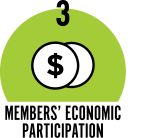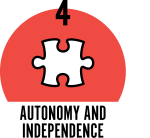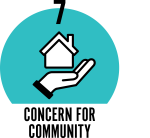Our Mission
To be a dynamic, progressive organization guided by cooperative principles and to provide energy and other value-added services to its members. The Cooperative will participate in its communities, providing leadership and support to improve the quality of life for all of its citizens.
We are an independent, private and not-for-profit organization owned by the members we serve. We work hard every day to provide safe, reliable and affordable electric service and ensure your needs are always met.
Co-op leaders and employees are members of your local community. Our nine board members live right here in our local area and are elected by co-op members, just like you! Board members serve three-year terms and elections are held before our Annual Meeting each spring.
We belong to the communities we serve. We are proud that we make a difference in our communities and will continue to do so by promoting programs that improve the lives of those who live in the communities we serve.
We are not-for-profit. Since we are a cooperative, any excess revenue is shared among the people we serve. Our co-op has returned more than $63 million in capital credits to members over the years.
Every Member Has a Voice
The best part about being a member of the cooperative is just that … it’s your cooperative. You have a say in how the cooperative is run, because membership also equals ownership. Being locally owned, operated and democratically run means you can trust us to focus on your needs, local priorities, and decisions that are best for your community.
Did you know...
Electric Cooperatives:
- Are located in 80% of the nation’s counties
- Are the largest electric utility network in the nation
- Total more than 900 local systems in 47 states
- Have 42 million member-owners
- Distribute power over 2.5 million miles of line
- Serve 75% of the U.S. land mass
- Own $130 billion in generation, transmission, and distribution assets
- More than 88% of all local electric co-ops offer electricity generated from renewable sources.
The Seven Cooperative Principles
Cooperatives around the world operate according to the same set of core principles and values, adopted by the International Co-operative Alliance. These principles are a key reason why America’s electric cooperatives operate differently from other electric utilities, putting the needs of our members first.
 Membership in a cooperative is open to all persons who can reasonably use its services and stand willing to accept the responsibilities of membership, regardless of race, religion, gender or economic circumstances.
Membership in a cooperative is open to all persons who can reasonably use its services and stand willing to accept the responsibilities of membership, regardless of race, religion, gender or economic circumstances.
 Cooperatives are democratic organizations controlled by their members, who actively participate in setting policies and making decisions. Elected representatives (directors/trustees) are elected from among the membership and are accountable to the membership. In primary cooperatives, members have equal voting rights (one member, one vote); cooperatives at other levels are organized in a democratic manner.
Cooperatives are democratic organizations controlled by their members, who actively participate in setting policies and making decisions. Elected representatives (directors/trustees) are elected from among the membership and are accountable to the membership. In primary cooperatives, members have equal voting rights (one member, one vote); cooperatives at other levels are organized in a democratic manner.
 Members contribute equitably to, and democratically control, the capital of their cooperative. At least part of that capital remains the common property of the cooperative. Members allocate surpluses for any or all of the following purposes: developing the cooperative; setting up reserves; benefiting members in proportion to their transactions with the cooperative; and supporting other activities approved by the membership.
Members contribute equitably to, and democratically control, the capital of their cooperative. At least part of that capital remains the common property of the cooperative. Members allocate surpluses for any or all of the following purposes: developing the cooperative; setting up reserves; benefiting members in proportion to their transactions with the cooperative; and supporting other activities approved by the membership.
 Cooperatives are autonomous, self-help organizations controlled by their members. If they enter into agreements with other organizations, including governments, or raise capital from external sources, they do so on terms that ensure democratic control as well as their unique identity.
Cooperatives are autonomous, self-help organizations controlled by their members. If they enter into agreements with other organizations, including governments, or raise capital from external sources, they do so on terms that ensure democratic control as well as their unique identity.
 Education and training for members, elected representatives (directors/trustees), CEOs and employees help them effectively contribute to the development of their cooperatives. Communications about the nature and benefits of cooperatives, particularly with the general public and opinion leaders, helps boost cooperative understanding.
Education and training for members, elected representatives (directors/trustees), CEOs and employees help them effectively contribute to the development of their cooperatives. Communications about the nature and benefits of cooperatives, particularly with the general public and opinion leaders, helps boost cooperative understanding.
 By working together through local, national, regional, and international structures, cooperatives improve services, bolster local economies and deal more effectively with social and community needs.
By working together through local, national, regional, and international structures, cooperatives improve services, bolster local economies and deal more effectively with social and community needs.
 Cooperatives work for the sustainable development of their communities through policies supported by the membership.
Cooperatives work for the sustainable development of their communities through policies supported by the membership.

